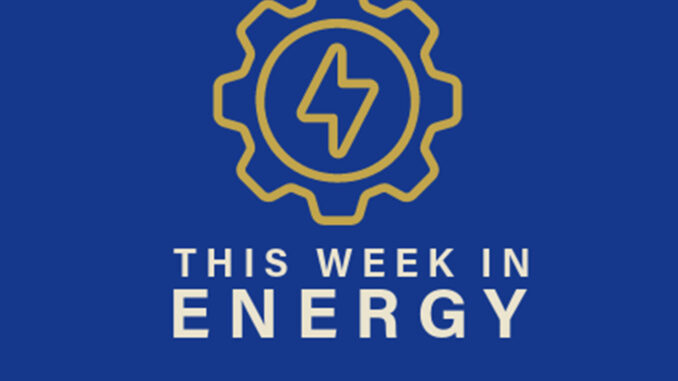

Here are the Special Guest, Industry Experts and Community Leaders in the episode of This Week In Energy for January 4, 2025:
Former Bismarck (ND) Mayor and current Burleigh County Commissioner Steve Bakken and Jason Spiess made their 2025 predictions this week on Townsquare Media’s Talk of the Town’s Wattage Wednesday.
Energy transitions also took center stage as the hosts dissected the role of carbon pipelines. With projects like Summit Carbon Solutions potentially breaking ground, Bakken cited local opposition and safety concerns, as well as regulatory hurdles in South Dakota as a key roadblock to the project.
Spiess cited the emerging acceptance of ethanol by industry executives and political parties while Bakken disagreed with ethanol’s role in energy. Both agreed that without government intervention in the marketplace, ethanol would not have survived in the free market. Bakken also questioned the choice of fuel over food in agriculture energy production.
Bakken continued explaining how carbon is becoming a dividing topic amongst the general population and this will be the year “the house of cards comes crashing down”. Spiess disagreed with Bakken explaining that the carbon management industry is in the first inning, will become the new centralized marker for your quality of life and is currently being controlled, funded and managed by the state, corporations and public private partnerships (aka nonprofits).
Bakken and Spiess also discuss a number of items surrounding President Trump’s new cabinet members, from RFK Jr to Doug Burgum to Chris Wright, as well as whether traditional energy sources like oil and gas would be promoted without the push for Artificial Intelligence and lucrative government contracts in technology.


Nate Washburn, Energy Information Administration, gives an update on propane, diesel, gasoline and residential heating prices.
The average retail price for home heating oil rose 1.7 cents from last week to $3.57 per gallon. That’s down 39.4 cents from a year ago, based on the residential heating fuel survey by the U.S. Energy Information Administration. Heating oil prices in the New England region are at $3.55 per gallon, up 1.7 cents from last week, but down 40 cents from a year ago.
The average retail price for propane is $2.53 per gallon, up 7-tenths of a cent from last week’s price, and up 5.2 cents from a year ago, based on the residential heating fuel survey by the U.S. Energy Information Administration. Propane prices in the Midwest region averaged $2.03 per gallon, up 6-tenths of a cent from last week, and up 2.5 cents from a year ago.

Vickie Schmidt, Schmidt & Associates discusses a variety of drug testing methods in the Bakken oil fields and industrial workplace.
Drug testing has significantly advanced in the past 15 years, reflecting technological innovations, changing societal norms, and the emergence of new substances. Schmidt gives an overview of how the landscape of drug testing has evolved, touching on testing panels, drug types, synthetic testing, and attempts to circumvent the system.
Fifteen years ago, standard drug tests often targeted a narrow range of substances, typically focusing on five or ten-panel tests for common drugs like marijuana, cocaine, and opiates. Today, advanced panels detect a broader spectrum of substances, including synthetic opioids like fentanyl and designer drugs such as synthetic cannabinoids and cathinones (e.g., “bath salts”). Employers and laboratories have adapted to address the opioid epidemic and the proliferation of new psychoactive substances.
The rise of synthetic drugs has posed challenges for traditional drug testing. Substances like fentanyl and synthetic cannabinoids often require specialized methods for detection. Laboratories now use advanced analytical techniques, such as liquid chromatography-mass spectrometry (LC-MS), to identify these substances accurately.
Modern drug testing employs more sophisticated methods, such as hair follicle analysis and oral fluid testing, in addition to traditional urine and blood tests. These newer methods offer longer detection windows and are less invasive. Digital advancements allow for faster turnaround times and higher sensitivity in detecting low concentrations of drugs.
The evolution of drug testing has been matched by increasingly creative efforts to cheat the system. Common methods include synthetic urine, urine substitution, and adulterants designed to mask drug metabolites. Some individuals attempt to dilute samples or time their usage to avoid detection.
However, labs have become more adept at identifying these tactics, incorporating temperature checks, adulterant testing, and direct observation during sample collection to maintain test integrity.

The legalization of cannabis in many regions has led to debates about its inclusion in routine testing. Some employers have chosen to exclude cannabis from their panels unless safety-sensitive roles are involved. The shifting perception of drug use, coupled with the rise of remote work, has also influenced how and when testing is conducted.
Looking ahead, wearable technology and continuous drug monitoring systems could revolutionize testing, providing real-time insights into substance use. These advancements promise even greater precision and adaptability in addressing emerging drug trends.
The past 15 years have brought remarkable progress in drug testing, balancing technological capabilities with evolving drug use patterns and societal norms. As new challenges arise, the industry continues to innovate to ensure effective and fair testing.

Executive Coach Joe Sinnott, Witting Partners, and the host of The Energy Detox Podcast joins Jason Spiess to discuss culture building within an organization. The interview keeps the theme of change within an organization, but what happens if the change stays the same?
Sinnott guides and coaches Spiess on how he would advise and coach an executive having to make tough decisions when making enough major changes that employees are demoted, lose their job or have to become an old dog who must learn new tricks.
“In what ways might you be unwittingly damaging your most important relationships?” You undoubtedly strive for elusive work/life balance, but are you being challenged to see when your intentions alone aren’t enough?”
To listen to the full length interview click here

Warren Martin, Kansas Strong, reviews and reacts to the latest episode of Landman, streaming exclusively on Paramount +. In Landman Episode 8, ‘Clumsy, This Life’, Ariana and Cooper finally get the best of M-Tex Oil in their settlement, and Monty has a major scare after weeks of stress and anxiety.
In the last episode, Cooper and Ariana finally got together against Tommy’s advice, Monty took a big gamble with a new drilling deal, and Angela finally found a purpose by entertaining the folks at a retirement home. Oh, and Ainsley found a new beau in the town quarterback, Ryder.
Rebecca is going over the details of the explosion with Cooper in excruciating detail. Clearly, she’s looking for any tiny fact that could clear M-Tex of liability for the accident. She also tries to convince Cooper to get Ariana on their side and sign the agreement that’ll let them off the hook.
Elsewhere, Monty meets the Governor for lunch. (Which kicks off with a prophetic conversation about whether taking pills and medication can save your life. Keep that in mind!) Monty has an agenda for the meeting: he wants help with the cartel problem on the patch. He suggests the Texas National Guard trains in their territory, which could serve as a defense tactic and put the cartel off.
Warren Martin and Jason Spiess also discuss the suspension of reality and acceptance of Hollywood in order to truly enjoy Landman. The series has many specific instances of inaccuracies in detail and storylines that could upset professionals and industry executives, however, overall the series is a net positive for the industry despite the Hollywood sensationalism.
Singer Songwriters featured this week: Woody Pines, Moody River Band and Blind Joe.
This Week In Energy is a newsmagazine radio podcast which does qualify for FCC mandated Public Affairs time. This Week In Energy addresses issues of public interest, such as safety, education, poverty, environment, mental health, and/or employment. Published files and recordings of interviews available as public files to increase accessibility to the public and to ensure the security of information.
Everyday your story is being told by someone. Who is telling your story? Who are you telling your story to?
Email your sustainable story ideas, professional press releases or podcast submissions to thecontentcreationstudios(AT)gmail(DOT)com.



